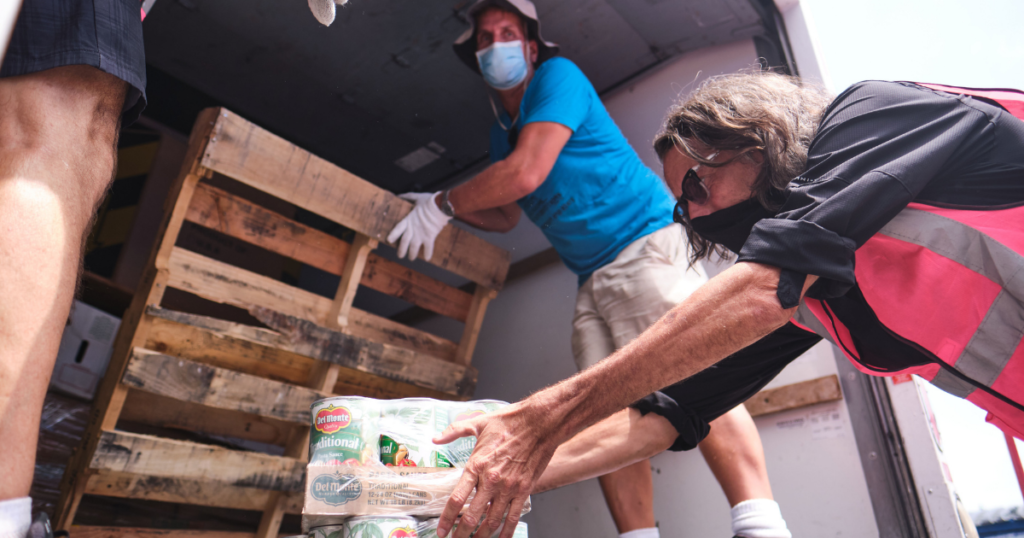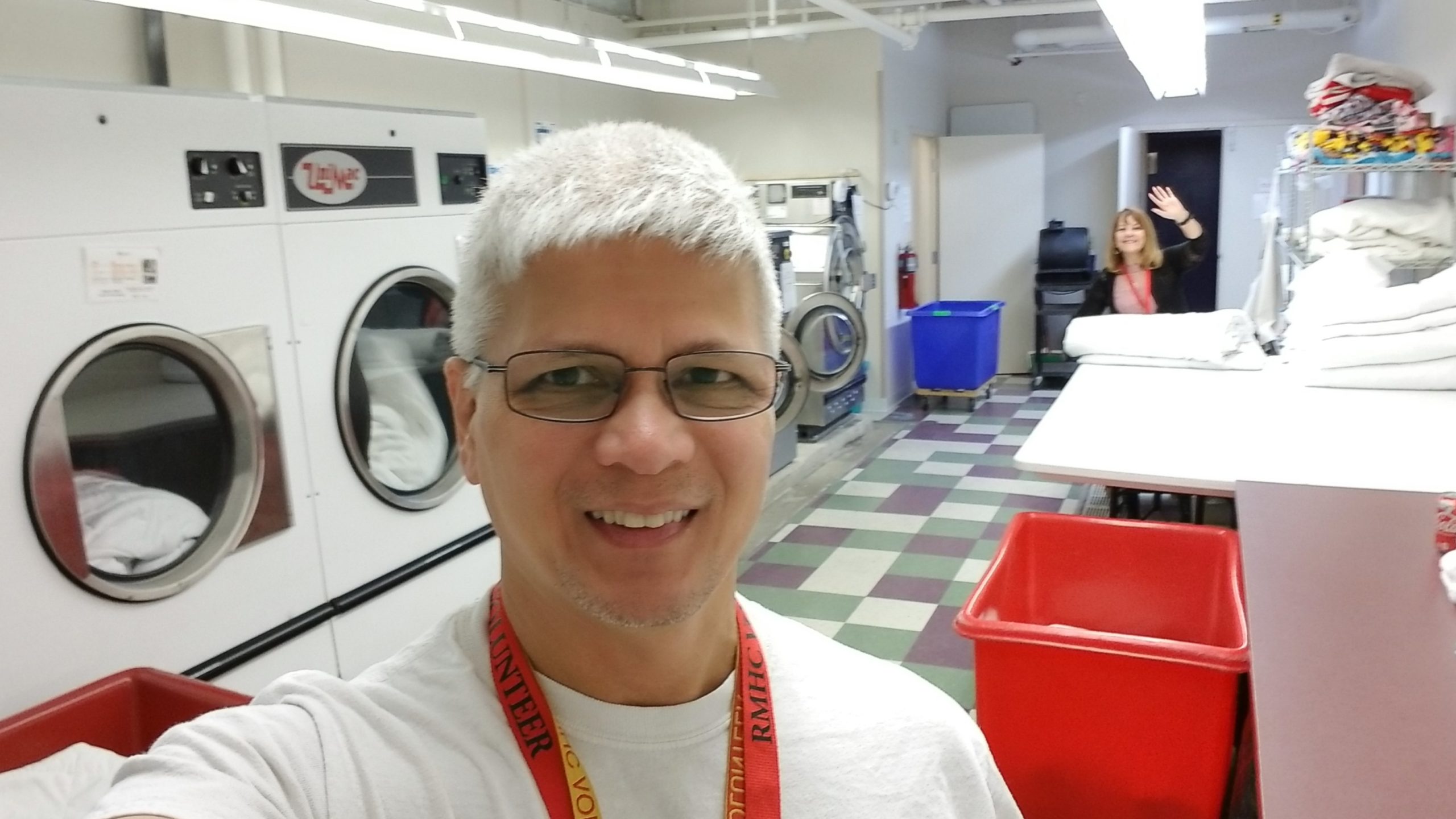
8 Insights From Our Open Discussion on Humanist Volunteering
By GO HumanityEach month FBB hosts a live Fireside Chat with grantees, volunteers, and friends. The last session was an informal open discussion with volunteers and team leaders in our Beyond Belief Network.
Here are a few of our favorite insights that came out of this free-flowing chat:
#1) When volunteering, one becomes an expert in unexpected topics.
“There’s an organization an online site called Volunteer Match, and they have thousands of opportunities. I don’t know how I actually came upon this one, but it’s by AIN, which is the Colorado radio station for the blind. And I did an audition for them and now — for someone who’s not a shopper get this: I read four different flyers every week for blind people so that they know what the good deals are. And it’s kind of ironic that for someone who hates to shop, here I am. I can probably tell you the best deals on everything.” -Evan Clark, Atheists United
#2) There are lots of pandemic-adjusted ways to start up a service project.
The top suggestions that came up were:
- Fundraising for a cause, remotely or in person. (Check out the BBN resources page for guides!)
- Community science projects. (Try the app iNaturalist!)
- Write letters or make calls to isolated people, like elders or incarcerated individuals
- Find an event on a site like Eventbrite or Meetup and join in as a team!
#3) The pandemic can be the perfect time to start things up.
“It was kind of a much different scenario, but the people who came back really needed [our group] and really needed that interaction, really needed those things. […] I think once things eventually get to the point of delta, zeta whatever things that we come through next —[volunteering] is gonna come back with a with a vengeance. And people that you probably only sell once or twice a year on coming out to volunteer are suddenly gonna be looking for that new place to belong, that new routine. -Sarah B. Miller, Camp Quest
“Frankly, we did maybe better during lockdown times because it was the only thing people could do. It was the only thing people ethically felt like they could put their time toward, even if it was a slight risk.” -Evan Clark, Atheists United
#4) It pays to team up with bigger causes.
“Let’s say Ronald McDonald House. […] Even though we only have a small number of us going there, we’re working with other volunteers. So that also takes some of the logistical strain off our leadership: that there’s already a scheduling system at Ronald McDonald House. There’s already a tracking system that tracks all the hours that people worked, and a whole arrangement for calling off your shift and all these things. So when we partner with other groups, sometimes we have less burden on us to run the activity. And even if only one of us shows up, it’s still a good activity and we still add to our statistics.” – Dave Nohle, Central Ohio United Non-Theists

Central Ohio United Non-Theists volunteers at Ronald McDonald House
#5) You can be important to your community during disasters.
“We saw that with the winter storm in Texas, we were able to get more people out there because we had a few [volunteer] teams in Texas. We raised almost $20,000 dispersed through those teams, and they were able to purchase food during a time when it was just really difficult with shipping coming in, trucks coming in. It wasn’t the easiest to get food to people. But they were able to do it relatively quickly because they were already there.” -Tif Ho, FBB
If you’re thinking about helping your community during hurricanes, fires, or other crises, FBB will help promote your group’s fundraisers to build the infrastructure! Just send us an email.
#6) Strengthen your core.
“I think [volunteers] just come and go. What’s key is having a core group that really knows what they’re doing. So in case you knock out any one or two of the super planners, you can still have a functioning program. So in our case we lost the guy who founded the program, but we still pulled [an event] off even with only 10 people. It was messier, it was slower, we swept more than we should have, but yeah… it was still a good program.” -Evan Clark, Atheists United
#7) Doing food distribution? Get on some lists.
“My local doctor’s office keeps a list of all food distributions in the region. So I’m now trying to reach out to them to make sure we’re on that list. And that suddenly tipped me off to all of these areas that are keeping lists of local food distributions and service providers, like doctor’s offices. So if you’re starting a new food distribution in a region, there are organizations maybe from universities to doctors offices that are keeping these lists, and all you have to do is get on those lists and you suddenly have clients and probably volunteers.” -Evan Clark, Atheists United
#8) Don’t give up!
Your volunteer events may not have the attendance you want for a while. But that’s okay!
“I think new groups often kind of give up before giving it a chance. They’ll, like, have two meetings and two people show up so they’re like, ‘Oh, this didn’t work,’ rather than maybe giving it six, seven, meetings before making that call. […] I think that hopefully when you’re able to have your in-person meetings that you’ll be able to give it a give it a few times to get people used to it.” -Wendy Weber, FBB
And don’t forget: FBB will help promote your events! Give us an email if you need a boost. And if you’re interested in starting up a team, check out our volunteer network page!
Watch the full discussion here:

